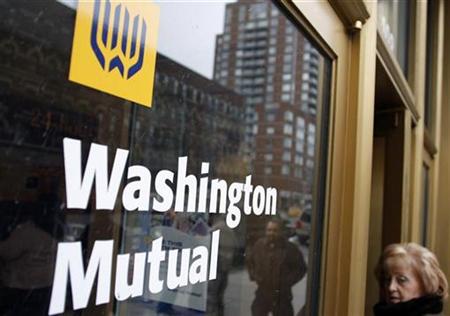Already battered, Washington Mutual shares fall as potential capital sources’ attention is diverted.

NEW YORK (CNNMoney.com) — Don’t forget about Washington Mutual.
Concerned that Wall Street has done just that, the nation’s largest savings-and-loan plummeted 22% in mid-day trading. Investors are concerned that potential sources of capital have disappeared in the upheaval this weekend on Wall Street that saw Lehman Brothers (LEH, Fortune 500) file the nation’s largest bankruptcy and Bank of America (BAC, Fortune 500) scoop up Merrill Lynch (MER, Fortune 500).
Washington Mutual (WM, Fortune 500) shares were battered last week, losing 36% of their value as investors grew increasingly nervous that the bank didn’t have enough capital to see it through the tsunami sweeping Wall Street.
After this weekend’s turmoil, however, WaMu has fewer places to turn if it needs another injection of capital beyond the $7 billion it raised in April. No one stepped in to save Lehman and Bank of America will now be busy digesting Merrill.
WaMu is one of the largest players in the mortgage market, which brought it prosperity during the housing boom and may lead to its downfall during the bust.
Seeking to reassure investors, the bank said late Thursday that it had sufficient capital and liquidity to see it through these tough times. It reported that it plans to set aside $4.5 billion in the quarter for loan losses, down from $5.9 billion in the prior period but more than two times expected charge-offs, or uncollectable loan losses. Reserves for loan losses should build to $10.3 billion, up from $8.5 billion.
The growth of net charge-offs is expected to slow to less than 20% in the quarter. In the prior period, charge-offs soared nearly 60%.
The bank said it expects its capital ratio, a measure of its ability to withstand loan losses, to remain “significantly above the levels for well-capitalized institutions.” It has about $50 billion of liquidity from “reliable” funding sources.
Analysts had mixed reaction to the report. Fitch Ratings and Moody’s subsequently downgraded WaMu, concerned about its ability to raise capital, while other analysts voiced concerns about depositors’ reactions.
“The biggest risk for WM is a run on deposits,” said Chris Brendler, analyst with Stifel Nicolaus & Co. “With all the negative headlines and recent IndyMac failure, WM’s retail deposit franchise is a huge concern to us as a significant outflow of consumer deposits could lead to devastating liquidity problems since the company has apparently already lost access to the capital markets.”
But some analysts said the results should restore some confidence in the company. They were heartened by the fact that the company feels it can put less aside for loan losses.
“Although not out of the woods yet, WM appears to be moving in the right direction on credit and 2008 is likely to be the peak year for provisioning,” Fox-Pitt Kelton analysts wrote in a note to clients.
By Tami Luhby, CNNMoney.com senior writer
Last Updated: September 15, 2008: 1:10 PM EDT
Source: CNNMoney